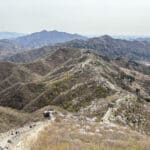Hurricane Katrina was a natural disaster of devastating proportions – but it was made so much worse by the actions of those who were elected to protect America.
The events we’ve seen unfold over the past week in New Orleans have been horrific. People watched as their lives were destroyed at a stroke by flooding. Thousands were stranded in the city, with food and water in short supply, as the plight of disease stalked those being held hostage by nature. And then, as will always happen in these kind of disasters, the inevitable looting and violence that occurs when people get desperate.
However, at every turn we see the fingerprints of the neo conservatives in turning a tragic situation into a catastrophe. The fundamental problem is the avoidance of what they call “big government”. This cult of individualism is nothing to do with capitalism and everything to do with an insane ideology that can cost lives. Frequently asked in the aftermath of the hurricane was “how could the world’s richest country be so unable to cope?”
The truth is that more than ever, the Bush administration has cut the threads of government from the people. As a percentage of GDP, the amount of money taken in tax is at its lowest since the early 1950s. In effect – this leaves you with a very rich country that has to be supported by a very poor government. And it fails miserably.
The evacuation of New Orleans should have been a massive, concerted effort. They knew it was a good idea: others fled. You can’t leave an evacuation to ‘individual responsibility’. But then, neo-cons don’t even believe in public transport – leaving the 21% of households without access to a car doomed.
Another thing neo-cons don’t believe in is any sort of concern for the environment. That’s why the Bush administration authorised building on the wetlands next to New Orleans, despite warnings that this would remove the natural barrier to a flood. And in order to cut taxes and undertake an enormous military operation in Iraq, they also decided to cut anything and everything they could from domestic budgets. Including fundings for flood prevention – slashed by 80% – and for the first time in 37 years work on the levees to protect the cities was stopped.
Even the looting and violence was made worse by the conservative insistence that it’s a good idea to let the general population arm themselves with ever more destructive weapons. Was it really surprising that these guns were then used in the struggle for survival?
American people should realise that this approach has no benefit to them. America would still be a rich country if it invested a little more in government, and learnt to stop the paranoia of a “big state”. I said earlier that this was nothing to do with capitalism – because the state has an active part to play. It’s not anti-capitalist to protect your citizens, and businesses, and apart from anything else this would lessen the economic impact of such terrifying acts of nature.
The saddest thing is that the famous, ‘can-do’ spirit of Americans was then rendered useless. It’s not that people didn’t want to help, but the infrastructure and co-ordination from central government simply was not there. Ironically, things fare better in other countries where American aid from both government and the people saves lives because the authorities know how to put it to good use.
George Bush in particular has proved himself unable to lead his country. It was bad enough to call the storm a “temporary disruption” but in his speeches since he hasn’t even appeared to offer sincere words of comfort to those affected. In contrast, politicians like Bill Clinton and Tony Blair are very good at these sort of public performances. And while it might seem odd to attach importance to such a superficial quality – it’s this ability that allows leaders to lead in times of crisis. Instead the picture emerged of Bush peering down at a ruined city from the safety of a helicopter.
Wasn’t the last election fought on the question of who could best protect America? And don’t the events of the past week tell us, as starkly as ever, that the neo-con approach has failed?
© Ruberyvillage.co.uk; We own DomSez, don’t mess.
You can comment on this article here









